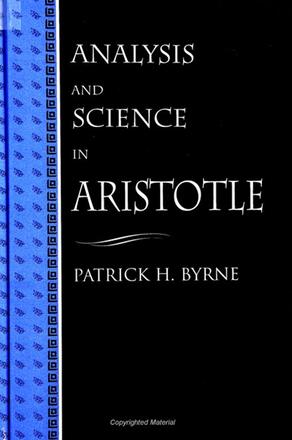
Analysis and Science in Aristotle
Alternative formats available from:
Presents a new interpretation of Aristotle's Analytics (the Prior and Posterior Analytics) as a unified whole, and argues that to "loose up" or solve—rather than to reduce or break up—is the principle meaning which best characterizes the Analytics.
Description
Offering a new interpretation of Aristotle's Analytics (the Prior and Posterior Analytics) as a unified whole, Patrick H. Byrne argues that a non-deductive form of ancient mathematical analysis influenced Aristotle's thinking. Reading the Analytics with this perspective in mind sheds new light on Aristotle's theories of the syllogism, demonstration and the principles of science.
The book begins with a brief survey of ancient geometrical analysis and an investigation of Aristotle's uses of the Greek term, analuein. Byrne argues that "to loose up" or solve—rather than to reduce or break up—is the principal meaning which best characterizes Aristotle's Analytics. Extending this line of reasoning, he argues that for Aristotle scientific analysis commonly begins with knowledge of a "mere fact" (a conclusion) and seeks a rigorous demonstration which expresses knowledge of the "reasoned fact. " Moreover, genuine analysis of a fact into a reasoned fact cannot be accomplished unless the premises of demonstrations are themselves reasoned facts. Hence the processes which yield the immediate principles (especially definitions) are next investigated through detailed examinations of key examples which Aristotle provides.
Patrick H. Byrne is Associate Professor of Philosophy at Boston College.
Reviews
"It approaches an 'old' topic in a fresh and promising manner. The author asks and gives reasonable answers to important questions that have been ignored by many scholars down through many centuries. " — Thomas V. Upton, Gannon University